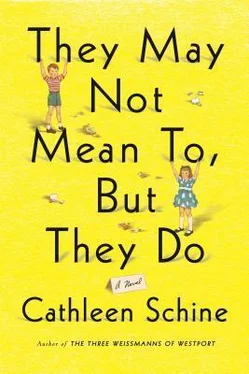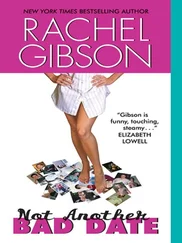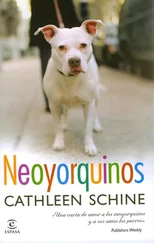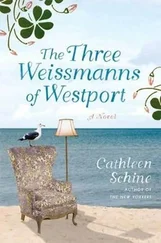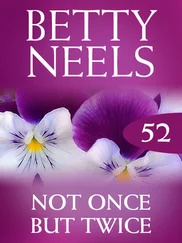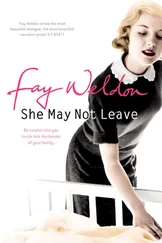Daniel was sitting in the chair beside the hospital bed. “The hospice nurse said he’ll last a day, maybe two.”
“Don’t say that in front of him, Danny,” their mother said. She had appeared in the bathroom doorway.
Daniel was looking at Molly the way he did when he wanted her to tell him what he should do.
“Aaron,” Joy said, “look who’s here. It’s Molly.”
Molly stood up straight. She kissed her mother. She kissed her brother. She took her wet coat off and hung it on the doorknob.
“Oh, Molly, really,” her mother said, grabbing the coat and taking it out of the room. “You of all people.”
“Hi, Daddy,” Molly said.
His eyes flickered. Maybe. She took his hand and kissed it.
“It’s me, Molly,” she said softly. She bent over and kissed his forehead. It was rough and fragile, like cheap paper.
“Speak up, honey,” Joy said, back in the room. “He doesn’t have his hearing aids in.” She began rummaging through drawers. “I’m sure they’re here somewhere. You hate them, Aaron, I know, but they do help.”
Hearing aids? Don’t forget your orthotics while you’re at it, both essential components of hospice care. “I don’t think he can hear me anyway, Mom. He’s kind of out of it, isn’t he? All that morphine…”
“What do you mean? Of course he can hear you. Of course you can, Aaron.”
“It’s me!” Molly said loudly.
The eyes flickered again.
“See?” said Joy. “Don’t go borrowing trouble, Molly.”
That night, Molly straightened the medicine bottles. The hospice nurses had lined them up neatly already. Molly reorganized the reorganization. Molly Mixinovitch, Aaron used to call her when she got like this.
“It’s a pick-me-up, isn’t it, Aaron? That Molly energy. And her friend Freddie, what a lovely person.”
Should she have said wife? “Well, wife, then.” She put on her reading glasses and found the ointment for Aaron’s lips. “Wife,” she said softly. “I am your wife, Aaron. Mrs. Aaron Bergman.” She began to say, Till death do us part, but stopped. “Nothing can part us.” Even death could not do that after so many years.
They had been Aaron and Joy for a lifetime. Joy contemplated the word “lifetime.” How sad that a word meaning a full span of experience, meaning a whole life, should carry within it the end of a life.
Marrying Aaron had been a triumph, the goal of her existence, of any girl’s existence in those days. A handsome, well-heeled man, that was part of it. A handsome, well-heeled man who didn’t care about money, that had been another part of it — he was an artist, a singer, contemptuous of the grubby world of commerce. On their first date he had lifted her up and carried her through the park singing. It was like a movie. She was swept away. She did not know the difference between carefree and careless in those days. She learned. There were trials and tribulations along the road. “We’ve had some sickness and health, haven’t we, Aaron? Some richer and poorer.” She dabbed the ointment on his lips. “Never a dull moment.” It didn’t seem possible that Aaron’s lips were so dry and cracked, lips she had kissed when they were practically a boy’s lips, nice well-formed lips, when she and Aaron were both young. Aaron’s young lips had been replaced, magically, by these chapped and papery ones. How proud she had been, proud of being in love, of finding love, as if love were a prize on a treasure hunt. Aaron smiled at her as they stood at the altar fumbling with their rings, a crooked smile he never turned on anyone else, until the grandchildren were born. It was a dangerous smile, full of promise and play. “That’s you, playful and full of promises.” He did not keep his promises, perhaps, but he never stopped making them, and that had been a different kind of honesty and keeping of the faith.
* * *
Molly threw the package of chipped beef away. Joy retrieved the package when Molly wasn’t looking. She put it back in the freezer.
* * *
Freddie and Molly took the girls to the Museum of Natural History to get them out of the apartment for a little while.
“They look so real,” Cora said. The enormous Alaskan bear loomed over her, a wounded seal at its feet.
“They are real,” said Ruby.
“They’re dead.”
“They’re still real.”
Freddie stepped away from the existential discussion to answer her phone. She backed against the case of the skunks. “Laurel, is anything wrong?”
“Not that we know of,” both sisters said at once. “But we thought we’d come see Dad in June. It’s a slow month for us. It might be the last time we see him. We have to be realistic.”
“He’ll be thrilled.”
“We have a very good package at the Disneyland Hotel for three nights, and then the Beverly Hills Hilton. Doesn’t it sound like fun? A night in Palm Springs, a quick trip to Vegas — we’ve got it all planned out. You let him know we’re coming. We’ll send you our itinerary. And, Freddie, we’re gluten-free. Just so you know.”
“Maybe you should call Dad and give him the good news. I’m sure he’d love to hear from you.”
“What if he didn’t know who we were?” Laurel said. “It would be so awkward. But you’ll know how to tell him. After all, Freddie, you see him all the time. We don’t.”
Freddie smiled a little at that. When she found Molly and the girls, they were examining the naked Neanderthals. Molly was distracted, worried about her father. Ruby and Cora were hungry.
“I still say the animals are not real.”
“Are they fantasies?” Ruby said contemptuously.
“Well, they are in a way,” Freddie said. “Nineteenth-century fantasies of everything wild. In their glass cases.”
Molly snorted.
Cora said, “Snort again!”
“If I went inside one of those cases and kicked one of those kudus,” Ruby said, “I’d hurt my foot. A fantasy wouldn’t bang my foot. A real kudu would. A dead, real kudu.”
“You refute Berkeley thus, Dr. Johnson,” said Freddie.
“Death is the only thing that’s real,” Molly said softly. Only Freddie heard her. She took Molly’s hand and they walked silently home across the park. Cora and Ruby skipped and cried out in English accents, “I’m Berkeley and nothing is real; I’m Dr. Johnson and I refute you thus,” kicking stones.
This is a general picture , the pamphlet said. Then it said that the skin turns a gray or green or bluish hue. Her father’s skin was gray and green and bluish. He is off-color, Molly thought, like a joke. As you hold his hand you may notice that it feels cold . Her father’s hand was as cold as ice, as death.
He was dead.
Joy came into the room.
“Oh, Mommy.” Molly pressed her face against her mother’s shoulder and cried in ugly dry heaving sobs.
“Molly, Molly.” Joy patted her back, kissed her cheek. “There, there, Molly. You must be so tired.” She turned to Aaron, lying still on his hospital bed. “That terrible jet lag,” she said to him.
“But Daddy … Daddy’s…”
“Come,” Joy said gently. “Aaron, we’re going to get some tea. Back in a minute!”
In the hall, she closed the door to the bedroom and said, “Now, what is it, sweetheart? I don’t want to have any sad discussion in front of Daddy.”
“But…”
“The booklet said you must always act as if he can hear you. Hearing is one of the last senses to go. We have to be careful not to scare him. He can hear what we’re saying even if he doesn’t seem to.”
“But, Mom—”
“The booklet said so,” Joy said fiercely. “It’s disrespectful to talk about dying in front of him. Do you understand?”
Читать дальше
